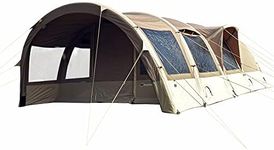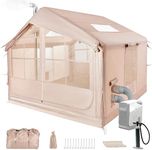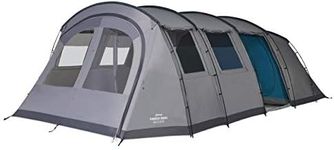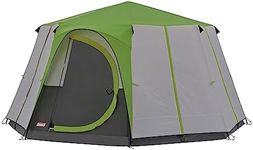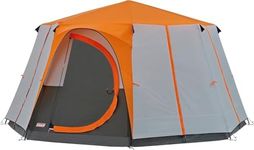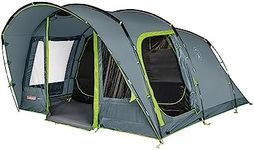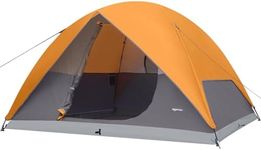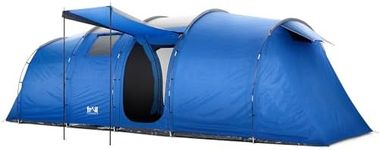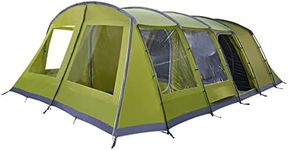Buying Guide for the Best 6 Person Tents
Choosing the right 6-person tent can make a significant difference in your camping experience. It's important to consider various factors to ensure that the tent you select meets your needs and provides comfort, protection, and convenience. Here are some key specifications to consider when picking a 6-person tent, along with explanations to help you make an informed decision.Size and DimensionsSize and dimensions refer to the overall space inside the tent, including the floor area and peak height. This spec is important because it determines how much room you and your companions will have to sleep, store gear, and move around. Tents with larger floor areas and higher peak heights offer more comfort, especially for taller individuals or those who prefer more space. When choosing, consider the number of people and the amount of gear you plan to bring. If you value extra space, opt for a tent with generous dimensions.
WeightWeight is the total mass of the tent when packed, including poles, stakes, and the tent body. This spec is crucial if you plan to carry the tent over long distances, such as during backpacking trips. Tents can be categorized into lightweight (under 10 pounds), mid-weight (10-20 pounds), and heavy (over 20 pounds). For car camping, weight is less of a concern, but for backpacking, a lighter tent is preferable to reduce the load. Choose a weight that aligns with your camping style and transportation method.
SeasonalitySeasonality indicates the tent's suitability for different weather conditions. Tents are typically rated as 3-season or 4-season. A 3-season tent is designed for spring, summer, and fall, offering good ventilation and protection against rain and wind. A 4-season tent is built to withstand harsher conditions, including snow and strong winds, making it suitable for winter camping. Consider the typical weather conditions you will encounter and choose a tent that provides adequate protection for those seasons.
Material and DurabilityMaterial and durability refer to the fabric and construction quality of the tent. Common materials include polyester, nylon, and canvas, each with its own advantages. Polyester and nylon are lightweight and quick-drying, while canvas is heavier but more durable and breathable. Durability is important for long-term use and resistance to wear and tear. If you camp frequently or in rugged conditions, opt for a tent made from high-quality, durable materials. For occasional use, lighter materials may suffice.
Ease of SetupEase of setup describes how simple and quick it is to pitch the tent. This spec is important because a tent that is difficult to set up can be frustrating, especially in bad weather or low light. Tents with color-coded poles, fewer components, and intuitive designs are generally easier to set up. If you are a beginner or often set up camp alone, look for a tent with straightforward assembly instructions and features that simplify the process.
VentilationVentilation refers to the tent's ability to allow airflow, reducing condensation and keeping the interior comfortable. Good ventilation is important to prevent stuffiness and moisture buildup, which can lead to discomfort and mildew. Tents with multiple windows, mesh panels, and vents offer better airflow. If you camp in warm or humid conditions, prioritize a tent with excellent ventilation features to ensure a pleasant sleeping environment.
Weather ResistanceWeather resistance encompasses the tent's ability to protect against rain, wind, and other elements. This spec is crucial for staying dry and comfortable during adverse weather. Look for features like a waterproof rainfly, sealed seams, and a sturdy frame. Tents with higher waterproof ratings (measured in millimeters) offer better protection against heavy rain. If you camp in areas prone to inclement weather, choose a tent with robust weather resistance to ensure you stay protected.
Storage and OrganizationStorage and organization refer to the tent's internal and external pockets, gear lofts, and vestibules for storing personal items and gear. This spec is important for keeping your tent organized and maximizing space. Tents with multiple storage options help keep your belongings off the floor and easily accessible. If you have a lot of gear or prefer a tidy living space, look for a tent with ample storage features to enhance your camping experience.
